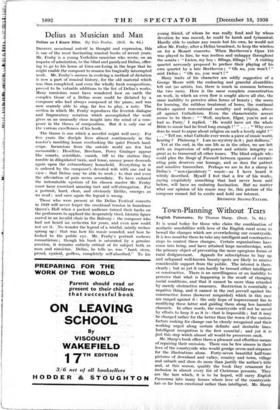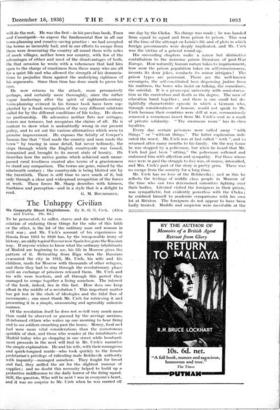Town-Planning Without Tears
English Panorama. By Thomas Sharp. (Dent. 7s. 6d.)
IT is usual today for those who claim the combination- of aesthetic sensibilities with love of the Paglish rural scene to bewail the changes which are overwhelming our countryside. It is less usual for them to take any intelligent and constructive steps to control these changes. Certain organisations have come into being, and have attained large memberships, with the primary object of preventing the more egregious forrni of rural disfigurement. Appeals for subscriptions to buy up and safeguard well-known beauty-spots are likely to receive considerable support from the public. The interest is there, clearly ; but as yet it can hardly be termed either intelligent or constructive. There is an unwillingness or an inability to perceive that what is happening is the result of changing social conditions, and that it cannot be more than retarded by merely obstructive measures. Restriction is essentially a negative thing, and it cannot in the end prevail against the constructive forces (however misguided) which in this case are ranged against it : the only hope of improvement lies in modifying these latter and guiding them along less harmful channels. In other words, the countryside will not be saved by efforts to keep it as it is—that is impossible ; but it may be changed rather for the better than the worse if the various factors making for change can be clearly recognised and their working urged along certain definite and desirable lines. Intelligent recognition is the first essential ; and yet it is just this step which almost all would-be preservers omit.
Mr. Sharp's book offers them a pleasant and effortless means of repairing their omission. There can be few sincere in their love of the countryside who would grudge seven-and-sixpence for the illustrations alone. Forty-seven beautiful half-tone pictures of downland and valley, country and town, village and suburb and slum do more than justify the author's title and, at this season, qualify the book they ornament for inclusion in almost every list of Christmas presents. They are the lure which, it is to be hoped, will carry English Panorama into many homes where love of the countryside has so far been emotional rather than intelligent. Mr. Sharp
will do the rest. He was the first—in his previous book, Town and Countryside—to expose the fundamental flaw in all our town-pi • fling and country-saving practice : we had accepted the towns as incurably bad, and M our efforts to escape from them were desecrating the country all round them with miles of mock villages, neither town nor country, with few of the advantages of either and most of the disadvantages of both. On that occasion he wrote with a vehemence that laid him open to the charge of crankiness from those many who are all for a quiet life and who allowed the strength of his denuncia- tions to prejudice them against the underlying rightness of his arguments. Since then time has done much to prove his case.
He now returns to the attack, more persuasively perhaps, and certainly more thoroughly, since the rather vague hankerings after the spirit of eighteenth-century town-pladning evinced in his former book have been sup- planted by a frank recognition of the very different solutions called for by the different conditions of life today. He shows no partisanship. He advocates neither flats nor cottages, towers nor terraces, but recognises the claims of all. He is content to show what is undoubtedly wrong in our present policy, and to set out the various alternatives which seem to promise improvement. He exposes the fatuity of Cowper's famous line that "God made the country and man made the town" by tracing in some detail, but never tediously, the steps through which the English countryside was tamed, humanised and, brought to its recent state of beauty. He describes how the native genius which achieved such unsur- passed rural loveliness created also towns of a graciousness to stand any comparison. The towns are gone, ruined by the nineteenth century ; the countryside is being blotted out by the, twentieth. There is still time to save much of it, but only through a, clear and widespread recognition of the forces at work. These forces Mr. Sharp describes with fairness, frankness and perception—and in a style that is a delight to











































 Previous page
Previous page